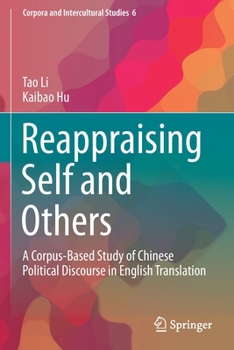Reappraising Self and Others: A Corpus-Based Study of Chinese Political Discourse in English Translation
Select Format
Select Condition 
Book Overview
Chapter 1 Introduction1.1 Rationale1.1.1 Appraisal System and appraisal epithets1.1.2 The genre of political discourse1.1.3 Corpus-based discourse analysis1.2 Objectives and Research Questions1.3 Significance of This Study1.4 Organisation of the ThesisChapter 2 Research Background2.1 The Overview of CTS2.1.1 CTS in general2.1.2 CTS in the Chinese context2.1.2.1 Translation-oriented corpus compilation and processing2.1.2.2 TU studies in the Chinese context2.1.2.3 Linguistic patterns in Chinese-English language pair2.1.2.4 Corpus-based studies on translational norm2.1.2.5 Corpus-based studies on translator's style2.1.2.6 Corpus-based interpreting studies2.2 Political Discourse2.2.1 Political discourse in general2.2.2 Political discourse analysis in the Chinese context2.2.3 Political discourse in Translation Studies2.3 Appraisal System2.3.1 Appraisal System in discourse analysis2.3.2 Appraisal System in corpus-based discourse analysis2.3.3 Appraisal System in Translation Studies2.4 SummaryChapter 3 Theoretical Framework and Methodology3.1 A Combined Theoretical Framework3.1.1 The framework of Appraisal System3.1.2 The Ideological Square model3.1.3 Summary of theoretical framework3.2 Methodology3.2.1 Research methods3.2.2 Corpus design3.2.3 Data collection3.2.3.1 Identification of appraisal epithets3.2.3.2 Parallel concordances3.2.3.3 Illustration of appraisal epithet tagging3.2.4 Data analysis with comparison models3.3 SUMMARYChapter 4 Translation of Appraisal Epithets in Chinese Political Discourse4.1 Appraisal Epithets in Chinese Political Discourse4.1.1 The distribution of appraisal epithets in Chinese political discourse4.1.2 The frequency of appraisal epithets in Chinese political discourse4.2 Translation of Appraisal Epithets in Chinese Political Discourse4.2.1 Translation of Attitude epithets4.2.1.1 Translation of affect epithets4.2.1.2 Translation of judgement epithets4.2.1.3 Translation of appreciation epithets4.2.2 Translation of Engagement epithets4.2.2.1 Translation of Engagement epithets in Self-category 4.2.2.2 Translation of Engagement epithets in Other-category4.2.3 Translation of Graduation epithets4.2.3.1 Translation of Graduation epithets in Self-category4.2.3.2 Translation of Graduation epithets in Other-category4.3 SummaryChapter 5 Translation Patterns of Appraisal Epithets and Variations of Stance5.1 Translation Patterns of Appraisal Epithets in Chinese Political Discourse5.1.1 Translation patterns of appraisal epithets in general5.1.2 Translation patterns of Attitude epithets5.1.3 Translation patterns of Engagement epithets5.1.4 Translation patterns of Graduation epithets5.1.5 Translation patterns of China5.1.6 Translation patterns of other countries5.2 Variations of Stance Through Translating Appraisal Epithets5.2.1 Variations of stance through translating Attitude epithets5.2.2 Variations of stance through translating Engagement epithets5.2.3 Variations of stance through translating Graduation epithets5.2.4 Variations of stance through translating appraisal epithets5.2.5 Variations of stance towards China and other countries5.3 Theoretical Account for Translatioin Shifts and Variations of Stance5.3.1 A Linguistic account5.3.2 A Politeness account5.3.3 An Ideo
Format:Paperback
Language:English
ISBN:9811594902
ISBN13:9789811594908
Release Date:February 2022
Publisher:Springer
Length:194 Pages
Weight:0.69 lbs.
Dimensions:0.5" x 6.1" x 9.2"
Customer Reviews
0 rating





